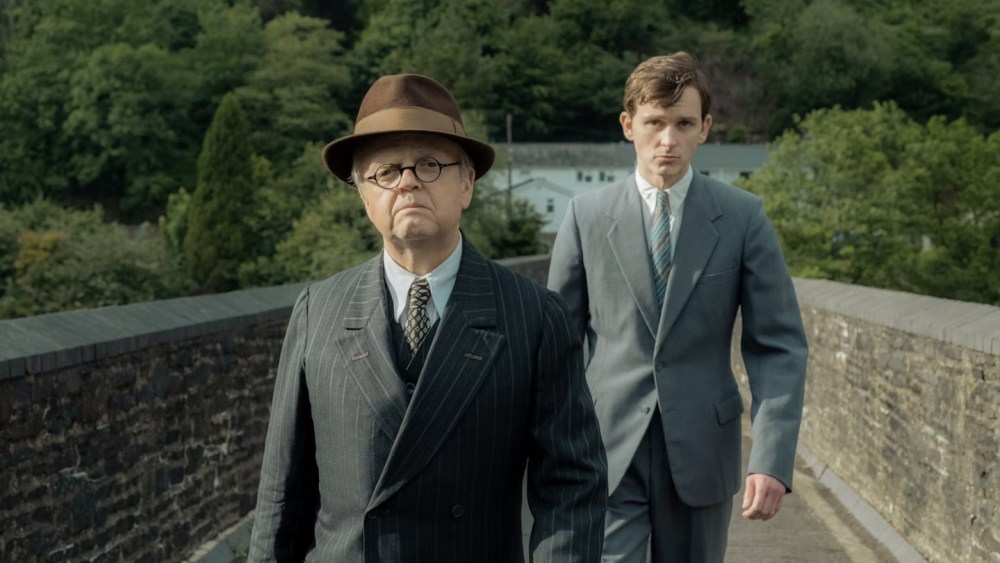Gentle Biopic on Richard Burton’s Early Years
Richard Burton never got around to writing an official set of memoirs before his untimely, alcohol-hastened death in 1984, though the star’s posthumously published diaries are among the great volumes of their kind in the showbiz library: sometimes brutally candid about himself, often savagely catty about others, and reflective of a wry, wicked mind behind the boorish antics that kept him in the headlines. There’s little of that wit or mischief to be found in Marc Evans‘ quiet, earnestly soft-hearted biopic “Mr. Burton,” though that discrepancy is at least partly the point.
Dramatizing the Welshman’s formative early years as an actor, from his rough working-class adolescence to the brink of celebrity in his mid-twenties, Evans’ film intends to show us an unformed boy scarcely recognizable as the imposing, burgundy-voiced lead of “Who’s Afraid of Virginia Woolf?” and “Look Back in Anger,” right down to his unfamiliar childhood name: Richie Jenkins.
Indeed, for at least most of the film’s running time, the eponymous Mr. Burton is not Richard but Philip: a kindly, unassuming schoolmaster in a small Welsh mining town, with a passion for theater that rubs off on a certain naive, bright-eyed 17-year-old boy in his English class. As played by Toby Jones with his customary retiring restraint, Philip is unexpectedly the central figure of Tom Bullough and Josh Hyams’ literate, comfortingly old-fashioned script, which lightly simplifies and romanticizes certain details of a Hollywood life story that was already movie-ready in its extreme rags-to-riches arc.
Rising talent Harry Lawtey (“Joker: Folie à Deux,” TV’s “Industry”) does a fine job of shaping a gawky, thick-accented teen into a glimmer of the imperious, impossible thespian to come — if one’s initial gut response to his performance is that he’s no Richard Burton, well, neither is he meant to be. But it’s the older man’s progression from unfulfilled loner to inadvertently star-making father figure that “Mr. Burton” limns most sympathetically, even if it makes this handsome, burnished production (opening theatrically in the U.K. this week) more of a niche item than a straight-up Burton biopic might have been.
Aged up a good 20 years in the film, Philip is presented here as something of an elder Mr. Chips figure: a respected, wholly benevolent educator who has largely set aside his own personal ambitions to advance the lives and minds of his students. Outside the classroom, and aside from daily chats with his loyal landlady Mrs. Smith (Lesley Manville, bringing warmth and good humor to a stock part), his is a solitary existence. The script remains uncommitted on the matter of this confirmed bachelor’s sexual orientation, but it’s a point of speculation in the community around him — particularly when he takes a special interest in young Richie, who, while not an outstanding student, has an affinity for poetry and literature that his peers lack.
The boy could use a paternal influence: He shares a name but little more with his widowed, dissolute coal-miner father (Steffan Rhodri), and has been raised since infancy by his older sister Cecilia (Aimée-Ffion Edwards) and her roughneck husband Elfed (Aneurin Barnard). Education isn’t in the family tradition, much less acting, but Philip identifies rare talent in the kid and takes him on as a cause. Cue “Pygmalion”-style lessons in elocution and aspirating, while Elfed voices concern that Richie is too readily leaving his roots behind. The classism that endures to this day in the British acting world rears its ugly head here, though Philip’s effective gentrification of Richie’s voice is depicted as the making of a legend.
To allay any untoward suspicions about their relationship, Philip eventually proposes adoption, with a name change to boot: The film fudges some facts around this while ultimately underlining the familial nature of the two Burtons’ bond. It’s a little disappointing that “Mr. Burton” remains so coy around Philip’s inner life and yearnings, though Jones’s graceful, precise performance in nuanced in its unspoken implications.
In its own way, “Mr. Burton” is an ode to the kind of stiff-upper-lipped emotional reticence that was once the default form of expression in British cinema — and that Burton’s own more abrasive generation of actors ultimately punched through. In his first released feature since 2011’s “Hunky Dory,” Evans’ filmmaking aims for throwback composure and classicism in all departments from Stuart Biddlecombe’s muted, crepuscular cinematography to John Hardy’s pretty if sometimes over-active orchestral score. If even the smoggy skies of a mining town occasionally look a little too painterly to be true, there’s some apt myth-making at work here.


